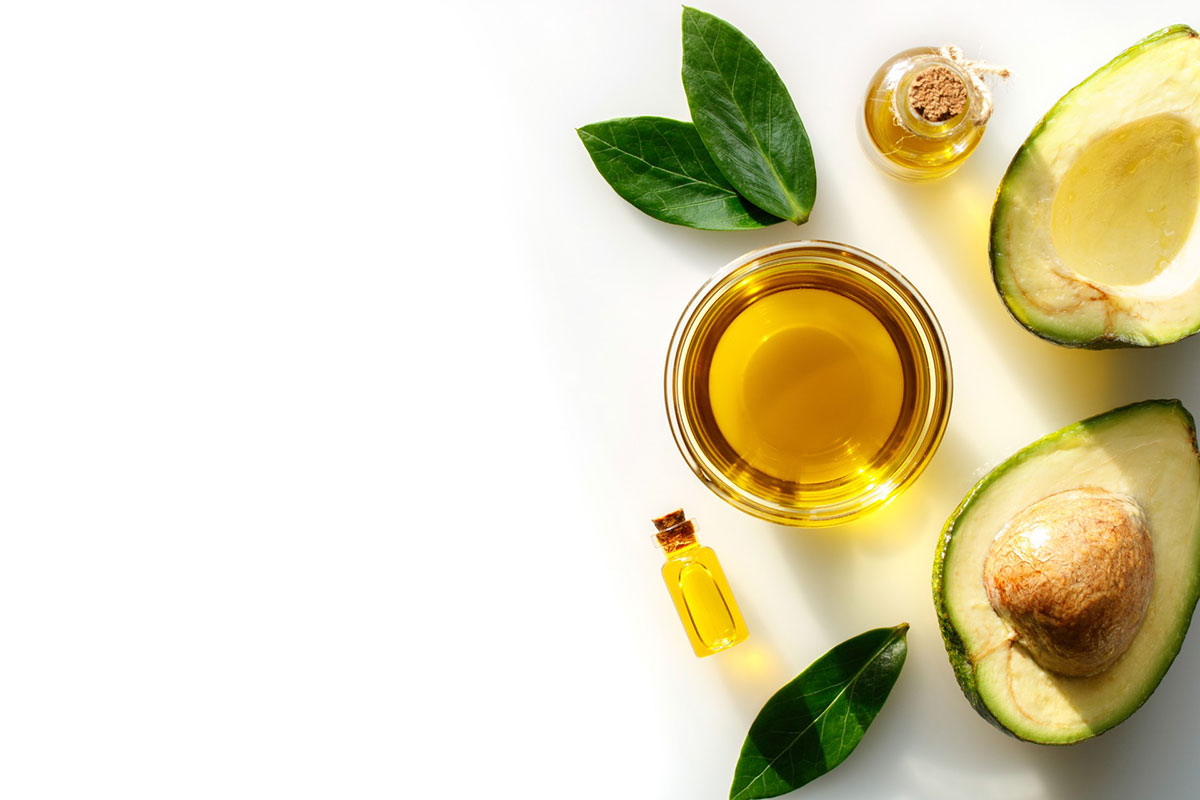Get a Free box of Gummies ($120 value) when you spend $200 or more. Now through Monday

In this blog you will learn about 5 key benefits of avocado oil and why you may want to consider incorporating this healthy fat as part of your dietary intake.
When we talk about beauty being skin deep, we don’t usually think about an avocado. But when you peel back that rough, thick exterior, the flesh of the avocado fruit is simply beautiful. With its bright green hue, the avocado boasts not only of a creamy texture and diverse use, but it also provides us with an oil that is naturally rich in many bioactive compounds. Learn why avocado oil is making its way to the table and considered a heart-healthy fat.
Avocados are often referred to as a superfood because they are considered an excellent source of nutrients that may have health benefits. Though avocado oil is derived from the pulp of this superfruit, it is categorized as a vegetable oil.
Avocado oil is nutrient dense, providing vitamins, minerals, antioxidants, healthy fatty acids and other naturally occurring substances like polyphenols. But let’s review some reasons why you like many, are reaching for certified organic avocado oil.
If you are looking for a high-quality avocado oil, then you may already have done your homework and may be seeking one that is certified organic. Organic avocado oil is usually mechanically cold pressed from the soft green flesh of organic avocados. It is pure and does not have any additives or other oils added to it. It is also devoid of any chemicals like ethanol or other solvents from undesirable extraction methods.
According to the definition by the U.S. Department of Agriculture (USDA), organic is a label that indicates that a food or agricultural product has been produced according to the USDA organic standards.1 These standards require practices that cycle resources, conserve biodiversity, and preserve ecological balance.1
Sounds great – but how does a consumer know that what they pick up for purchase, is indeed meeting these conservative organic guidelines?
Here are some of the USDA’s guidelines on organic labeling and when a product is eligible for use of the USDA seal:1
These may have a USDA seal.
These also may have a USDA seal.
These products though cannot carry a USDA seal.
These products cannot carry a USDA seal.
Like most consumers, selecting foods that are healthy for you is probably the most important factor that impacts your decision to purchase a product. For some, the cost of the food may solely drive the sale, while others’ standards include buying foods based on its nutritional value, coupled with reassurance that it is safe from pesticides and free from genetically modified organisms (GMOs) and even how the company contributes to sustainability.
Studies that have examined the nutrient value in organic and non-organic or conventionally sourced foods, like produce, indicate that there is a small to moderate increase in some nutrients in organic produce, however organic foods may have more of certain antioxidants than non-organic.2,3 There was a 20-40% more phenolic (antioxidant) compounds detected in organic crops than conventionally farmed crops and in some cases, greater than 60% more phenolic activity was noted in organic crops.3
Though pesticides are not used in growing organic crops, conventional farming methods may cause airborne pesticide residue from neighboring conventional farms to be deposited on some organic crops. However, when comparing both methods of farming, the detectable pesticide residue was four times lower in organic crops than the crops from conventional farms.3
Organic methods of organic farming that support both sustainability and yield, using green manure, small farms, and rotating crops demonstrated that the soil’s richness and the abundance of crops can increase across various crops worldwide compared to conventional farming practices.3
Now that we have discussed some advantages of choosing organic foods like organic avocado oil, let’s delve into the 5 key health benefits associated with this healthy dietary fat.
Avocado oil champions a healthy fat profile, providing a natural blend of monounsaturated and polyunsaturated fats. Both of these dietary fats (or lipids) are ‘good’ fats, (they aren’t saturated) and when consumed in moderation, complement a heart healthy diet.
Monounsaturated fats (MUFAS) are the predominant healthy dietary fats in avocado oil. In fact, 1 tablespoon of avocado oil contains approximately 70% of the fat in the form of monounsaturated fatty acids.4 It is also a great source of oleic acid, an omega-9 fatty acid (part of the monounsaturated fats) that provide support for healthy lipid profiles, like cholesterol.5,6
Looking to make a small change with a great health impact? Start with dressing your salad with some avocado oil instead of store-bought dressing. Pull out your sheet pan and line up your favorite veggies like broccoli, cauliflower, asparagus and carrots and drizzle some avocado oil on them before you roast them. Delish!
Certainly, sounds like some great reasons to change things up — for the health of it, don’t you think?
Antioxidants are naturally found in many foods like nuts, seeds, fruits and vegetables, and even vegetable oils like avocado oil. These little molecules are pretty powerful and look to protect our cells from free radicals, which are byproducts of metabolism and from toxins in our environment.
Antioxidants neutralize free radicals in our body, making them more stable and decreasing the chances of producing oxidative stress.7
Plain and simple — antioxidants such as carotenoids: lutein and zeaxanthin, vitamin E, and polyphenols are additional benefits of avocado oil; working to protect our healthy cells.
Let’s talk about another wonderful attribute of avocado oil’s nutrient composition — phytonutrients called polyphenols. Wow – that is quite a bit to digest, so let’s break this down a bit.
Phytonutrients are nutrients that are natural components found in plant-based foods that provide some health benefits.8 A category of the phytonutrient family is called polyphenols. Polyphenols are the most abundant antioxidants in our diets, along with other nutrients in plants like vitamins, minerals, and fiber, and they help the body to combat oxidative stress and naturally support a healthy inflammatory response.9
It is important to focus on eating a variety of foods like fruits and vegetables, as well as whole grains to support an optimal diet. Adding healthy fats rich in polyphenolic compounds, healthy fatty acids, and antioxidants make avocado oil a great substitute for saturated fats and oils like butter, palm oil, palm kernel oil, or coconut oil.
But the benefits don’t stop here. Let’s take a look to see what other health benefits you can relish from avocado oil.
Avocado oil contains lutein and zeaxanthin, two unique carotenoids (antioxidants) that may support healthy vision and overall eye health.6 These two antioxidants help to protect the macula and the retina of the eye. Lutein and zeaxanthin also support vision health through their antioxidant properties, protecting the eyes from damaging UV light and blue light exposure.10
Dietary fat is necessary for some nutrients to be effectively absorbed by the body. For example, foods rich in carotenoids such as dark-green leafy vegetables, carrots, tomatoes, and collard greens to name a few, are best absorbed when consumed with some dietary fat.9 In a study published in the Journal of Nutrition, adding avocado oil to a salad enhanced carotenoid absorption including: α-carotene, β-carotene, lycopene, lutein and zeaxanthin.11,12
‡ These statements have not been evaluated by the Food and Drug Administration. These products are not intended to diagnose, treat, cure, mitigate, or prevent any disease. Individual results may vary. The information provided in this blog is for educational and informational purposes only and should not be construed as medical advice.
References:
Author Bio:

Ken Swartz, MS is the co-founder, Chairman Emeritus, and former Chief Science Officer at C60 Power, a health and wellness company committed to delivering the highest quality Carbon 60 products available. Ken earned a Master of Science degree from the University of Colorado at Denver and a Bachelor of Science in Economics from Arizona State University.’